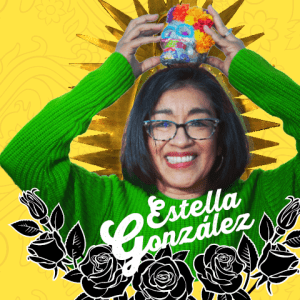This blog post comes from the Library's 16th Writer in Residence, Estella González. In it, she reflects on her time spent supporting writers in our community.
My inner library fangirl emerged early on when the elementary school librarian allowed me to check out any book I wanted. As a working-class family, we couldn’t afford luxuries like books, so the library satisfied my reading hunger. In junior high school, the public library across from the school became my second home, replete with hundreds of young adult books plus a Chicano collection near a replica of the ancient Aztec calendar. Noting the Spanish surnames on some of the spines, the possibility of authoring a book bloomed. Throughout my writing journey, public and school libraries offered me a path to achieving my writer dreams.
Therefore, when I found out I would serve as Pima County Public Library’s Writer-in-Residence, this fangirl swooned.
This residency connected me with emerging and experienced writers with similar dreams. The one-on-one consultations repeatedly proved something I already knew: the drive to put pen to paper, or fingers to keys intersects all communities, transcending socio-economic status, gender and culture.
In these half-hour sessions, hopeful authors revealed their varied, sometimes complicated, approaches to fiction, poetry and nonfiction. For instance, one writer expressed her hope to write a novel based in 19th-century England without having read or studied any books related to the era or country. After a discussion about her background, she realized her family history in 1970s Tucson would provide enough drama for several novels. Other authors who identified as neurodivergent detailed the children’s books they wished to write. I was impressed. I knew that children’s writing was a popular genre, but my awareness of its diverse themes grew when I explored the widespread displays at Quincie-Douglas and Flowing Wells libraries.
Some writers signed up for more than one consultation, including Susie who was gearing up to write a memoir for her upcoming sabbatical. She peppered me with questions about my writing journey since she had also lived in East L.A. Then there was Maureen who presented me with the elements of a potential short story at our first session. After recommending Writing What You Know: How to Turn Personal Experiences into Publishable Fiction, Nonfiction, and Poetry by Meg Files, she came back with rewritten pages, adding more details and dialog. We also discussed ways to help her properly format her pages.
“I’m going to sign up for more sessions with the next Writer in Residence,” she said on the last day of my residency. My fangirl cheered. It was gratifying to know Maureen would continue. If anything, successful writers must be persistent.
As part of my residency, I presented several programs including one titled “Writing in Community.” This particular presentation was designed to help writers jump-start their projects through writing sprints, a technique borrowed from National Novel Writing Month. More importantly, the program encouraged participants to find motivation and support through fellow aspiring writers. At the end of this program, that’s just what happened.
“Hey, why don’t we form our own writing group,” one participant said. Everyone nodded and shared emails. Now this group is set to meet this month to write. Woohoo! This time, the fangirl turned cartwheels.
A few writers asked about finding literary agents and publishers before actually producing any work. There’s no one sure-fire way to become a published-agented author except to write. Fortunately, there are many tactics to access that novel, collection or memoir bursting from inside a willing author. To that end, I recommended various strategies and resources:
Read books about writing
Books about creative writing help with motivation and accessibility. My favorites include A Writer’s Book of Days: A Spirited Companion & Lively Muse by Judy Reeves; Writing What You Know: How to Turn Personal Experiences into Publishable Fiction, Nonfiction, and Poetry by Meg Files; The Artist’s Way: A Spiritual path to Higher Creativity by Julia Cameron. All books are available for checkout at Pima County Public Library or for purchase at your local independent bookstore. My local favorites include Antigone Books and Barrio Books.
Join a writing class
Pima County Public Library offers free creative writing workshops, while writing centers like the University of Arizona Poetry Center charge a nominal free, but also provide scholarships. Check their events/calendar page for details. Pima Community College offers low-cost credit-optional courses in creative writing. Please check their catalog.
Go to a writing conference/book festival
When I first started, writing conferences provided connections to other writers and travel opportunities (I’m a Sagittarian). You also get to talk shop with other writers, famous ones, too. Some of the biggest include The Association of Writers and Writing Programs (AWP); Society of Children's Book Writers and Illustrators (SCWBI); and Kweli Journal’s Color of Children’s Literature Conference (summer) and International Literary Festival (fall). Both take place in New York City.
Create a writing group
Find them through Poets and Writers Magazine online, social media or connect with participants at a conference, class.
Go to author readings
Some Pima County Public Library’s offer author talks or you can make a request at your local library. Also, Tucson is fortunate to host the Tucson Festival of Books every March on the University of Arizona’s campus, one of the five largest in the country. Major and local authors like Luis Alberto Urrea, Natalie Diaz and the late bell hooks have read at this weekend event.
Access writer resources
Set up free accounts at Poets and Writers Magazine, Writer’s Digest and Submittable to access literary agents, literary journals and small presses. Participate in National Novel Writing Month (aka NaNoWriMo) in November and/or sign up for free resources and motivation from other writers in and outside of the U.S.
Good luck writers! Keep writing, reading, submitting and, most importantly, accessing your public library. Someday soon your library fangirl-turned-author will thank you.


